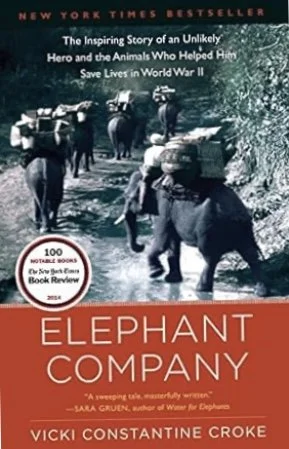Elephant Company by Vicki Constantine Croke (Random House)
Teak logging was a big business for Great Britain at the start of the 20th Century, with Burma producing 75% of the teak that was used by the world’s ship builders. It was a prime location for the Bombay Burma Trading Corporation, who sent young British men, “nomads of the forest,” into the jungles to manage logging camps.
This was a hazardous position. In 1920, 41 Englishmen were hired to work in “Upper Burma.” By 1927, only 16 of them were still alive. One of the original 41 (and the most notable of the 16 survivors) was Billy Williams, a young veteran, fresh from the trenches of World War I. He came because he was intrigued by the idea of working with elephants, an interest that would dominate his life for the next 25 years, giving him the nickname “Elephant Bill.”
Williams loved animals and had an understanding rapport with them that served him well in his new career. He soon became fascinated by the elephants that were an essential part of the logging business, particularly one named Bandoola who had a preternatural understanding of human language. If asked to hand a worker a particular tool, this elephant unerringly selected what was needed and handed it over without hesitation.
There was a peculiarly strong bond between Williams and Bandoola, perhaps because they had been born in the same month of the same year, and that bond led to an improved relationship with the other elephants that Williams worked with. Unique among his cohort, Bandoola was unscarred. When Williams discovered that this phenomenon had lived all his life in the camp, not captured in the wilderness and cruelly trained as the other elephants in the camp had been, he decided it was kinder, cheaper, and more efficient to raise baby elephants in the camp, training them with rewards and bringing them up with young boys who would later become their handlers. This humane standard of care became the norm in logging camps, along with elephant hospitals to cure the wounds incurred in this hazardous line of work.
When World War II began, the jungles of Burma became battlegrounds and elephants were a highly prized labor resource for both the Japanese and the Allies. Suddenly Williams was on equal terms with generals and guerrilla fighters, as the elephant advisor for the Allied forces. The Japanese put a price upon his head because he spirited away the pachyderms that they wanted for themselves.
At the height of his wartime career, Williams had 1652 elephants under his command, with Bandoola as their leader. In spite of his expertise and efforts, Burma’s elephants were sacrifices to warfare. Many of the British soldiers mistreated them, they were wounded in bombing raids and by landmines, and those that were under Japanese control were burned terribly by the acid from batteries that they were forced to carry.
“The more I see of man, the more I love my elephants,” Williams paraphrased and his love becomes contagious. Vicki Constantine Croke has done an immense amount of research and her lively writing style makes her facts irresistible. Elephants take center stage in this history, most particularly the one that was Elephant Bill’s pachyderm twin. Both Elephant Bill and Bandoola become unforgettable heroes in a biography that they companionably and equitably share.~Janet Brown

